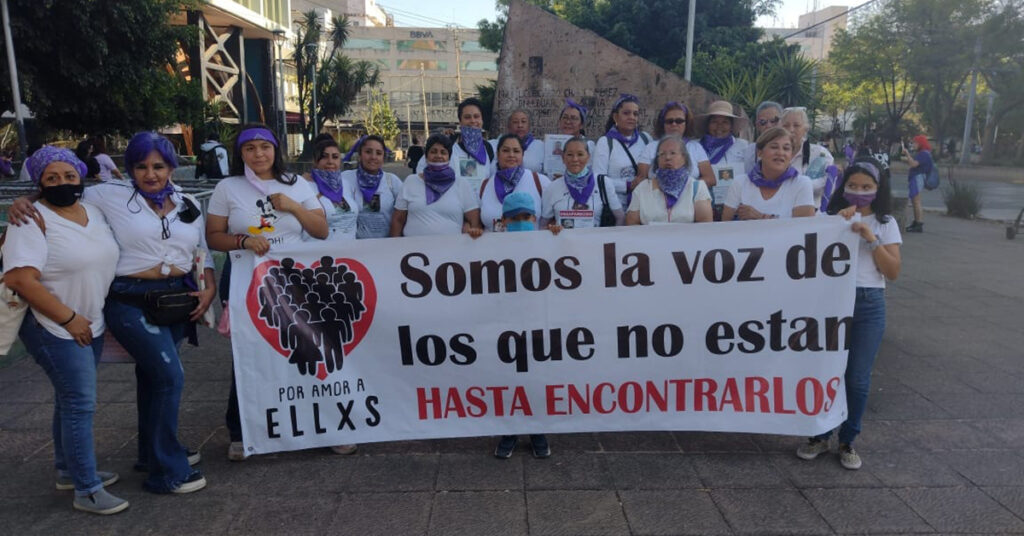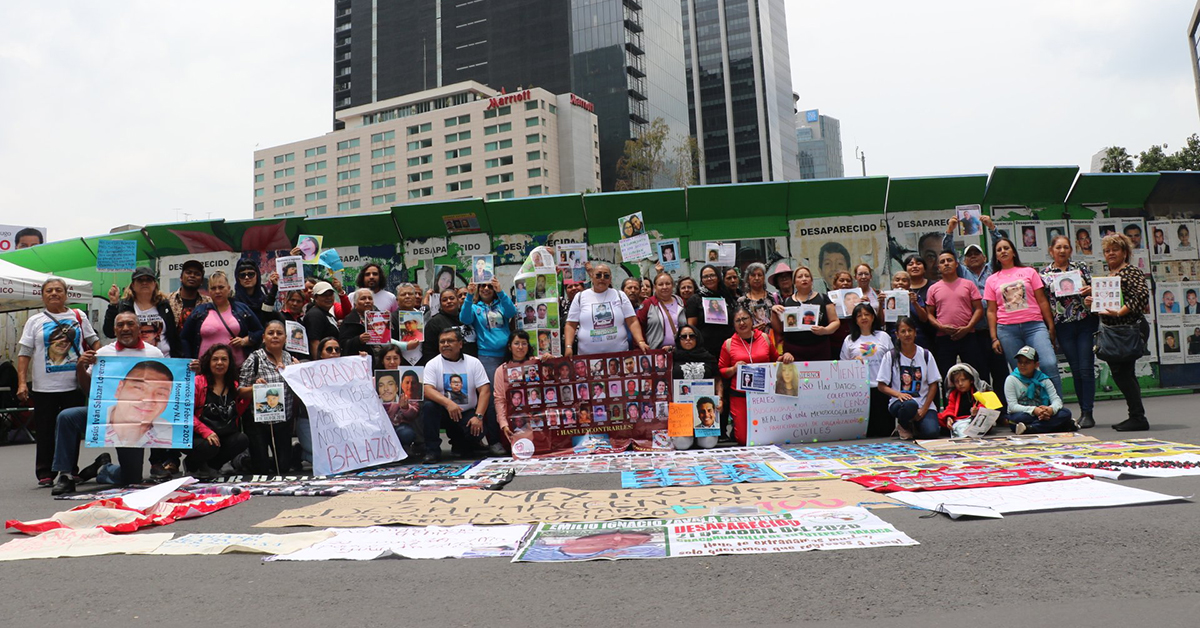On May 8 2022, the families of disappeared persons took over a memorial in Paseo de la Reforma, one of Mexico City’s most transited roads. Amidst the reconstruction of the space and the authorities’ disregard, the families put up photos and demand a memorial that acknowledges their loved ones’ names, faces and existence. Thereafter, the authorities planted an Ahuehuete tree – an iconic Mexican tree – which the families have named as “The guardian of the disappeared.” La Glorieta de las y los desaparecidos en Mexico is a meeting point for thousands of families dealing with unanswered questions and uncertainty.
There are more than 110,000 reported cases of missing persons in Mexico. To memorialise disappeared persons in the country, HURIDOCS’ Latin American programmes team is currently working with La Glorieta de las y los desaparecidos en Mexico to create a database in Uwazi to efficiently and securely document the cases and the support given to the families. The collective Por amor a Ellxs is an active member of this group whose aim is to support and advocate for the rights of the disappeared and their families. Although Por amor a Ellxs do not have the human resources to develop such a database on their own, they are taking part in this larger project among other families nationwide.

Esperanza’s search for her missing brother
Thursday 15 May 2014 started as a usual day for Esperanza Chavez in the city of Guadalajara in the region of Jalisco, Mexico. She met with her brother, Miguel Angel, to take his son to kindergarten while he went to work and later they would all meet to celebrate the boy’s fifth birthday. Miguel Angel never arrived, thrusting the family into a nightmare of uncertainty in a context where the authorities are conspicuous for their lack of action.
That same day the family approached the authorities but were told it was required for them to wait 72 hours to file the report, which is precious time to find missing individuals. Esperanza recalls walking all around town where the family thought he could be. It was only two days later that the authorities approached her mother’s house to communicate the official disappearance of Miguel Angel.
As of today, there are 110,982 individuals reported as missing in Mexico, of which 14,889 have gone missing in Jalisco, making it the region with the highest number of reported cases. But the numbers are likely much higher, as many go unreported due to fear, mistrust or lack of information. This is often due to the familiarity with the perpetrators. According to the collective Por Amor a Ellxs, only two out of 10 cases are reported.
“The prevailing numbers of the disappeared and the impunity surrounding these cases stems from the lack of punishment and accountability; there are no consequences,” says Esperanza firmly.
She remembers not having access to her brother’s file, where she could see the progress of the case, and access data gathered from his phone such as locations, satellite information and the call log. These are all vital pieces of information in the investigation as he was a lawyer who used his phone for workr. In addition, Esperanza travelled to Mexico City to call attention to her missing brother directly to the only state institution handling missing persons cases from all over the country.
“If there have been any actions towards my brother’s investigation, it is because I insisted and applied pressure,” says Esperanza, “I managed to access the 400 pages of the call log after he went missing, but it was only seven years after that when two official excavations took place to look for his body. But they didn’t find anything.”
To this day, Miguel Angel is still missing. Putting her life at risk, Esperanza is the only one in her family looking for him as they fear reprisals.
For love to them

The collective Por amor a Ellxs, translated to “For love to Them”, was created in 2016 in the city of Guadalajara by family members, primarily women, who lost their loved ones and their main objective is to find them. Esperanza is one of its most active members. Due to the lack of action from the authorities, the women take the investigations into their own hands and their restless vigilance stands as a testament to their unyielding commitment to finding the truth.
The collective handles investigations and searches for forensic medical services themselves to try to identify the bodies stored in the facility in Guadalajara. Additionally, through their social networks, they advise other on how to report a disappearance or begin the search and disseminate photographs to exert pressure so they are sought after.
Certainly, in a country where the system fails to support their search, Por amor a Ellxs also develops advocacy work and functions as a vigilant to the institutions in charge of investigations to ensure proper compliance of the due processes.
“There is a lack of transparency and access to information, the four institutions involved work as silos and this only hinders the investigation, identification and attention to the other victims, the families,” explains Monsterrat Narro, advisor for the collective . “One of the main challenges is the lack of empathy and the political willingness of those who govern us, here in Jalisco and on a federal level.”
Turning pain into action

Montserrat emphasises that the majority of collective members are women, often the mothers of missing individuals. Through their determination, these women have driven significant advancements in the official processes for disappeared persons.
The first achievement in 2016 after the foundation, the collective was part of the process to support eight families access their investigation file, which by law is their right but is oftentimes not respected. They also accomplished the creation of a psychological support programme for the families of the disappeared, led by the National System for Integral Family Development. Most notably, after a solid legislative advocacy work led by the collective and other organisations that started in 2017, the national congress passed the law on disappeared persons, and Por amor a Ellxs pressured the execution of this law in the state of Jalisco to stablish a state based search commission.
As they continue to look for their loved ones, the road ahead is long, with much work to do. Today they worry about the forensic crises all over Mexico. Identification mechanisms are not functional, disappeared individuals continue to be reported and unidentified bodies are on the rise.
“Although there are more and more discoveries in the records of clandestine graves and burials, these figures continue to be underreported,” says Esperanza. “We must remember that behind each number, there are people who have names, surnames, a family that is looking for them and people who miss them.”
- La Glorieta de los y las desaparecidos en Mexico has organised different activities for August 30 – the International Day of the Enforced Disappearances. Read more about it here.
- Read Por Amor a Ellxs’ press release for August 30: “For us, everyday is August 30”
